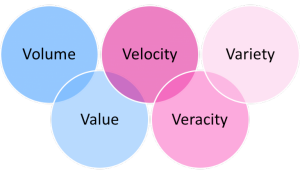Big Data – Why the Big Deal?
With the recent explosion on the vast amount of data from all sources, digital and non, it would be a too big of a disappointment if any organisation miss this. As both W. Edward Deming and Peter Drucker explains, ‘if you can’t measure it, you can’t manage it’.

Many organisations find it hard to understand the meaning of ‘Big Data’, the importance and relevance of this phase to their organisation. As aptly put forth by W. Edward Deming, it is important for any organisation to measure and manage the data, for if they do not measure then they do not know how to manage and execute any organisational decisions.
In the area of re-defining business, identifying and mitigating risk, introduce innovative products, enhancing customer experience, data driven analytics and decision making should be the heart of driving organizational results. Advanced digital technology and other technological penetration such as Cloud Computing, Internet of Things (IoT) plays a very crucial role in Big Data.
So, what is Big Data? In his book ‘Big Data Fundamentals’, Thomas Erl defines Big Data as:
“..a field dedicated to the analysis, processing, and storage of large collections of data that frequently originate from disparate sources.”
Image below are most commonly known as the 5 V’s of Big data which also describes the characteristics of Big Data.

What Is Big Data – To A Business ?
Data-driven decisions are better decisions. Big Data enables business and senior decision-makers to act on evidence, a data-driven decision than intuition. Organisation and leaders should drive insights from data, analysis and reasoning. They would also be able to explain the phenomenon on why any events happen, how they affect the organization, impact assessment and also prescribe the next best actions. With vast data now available, organisations should focus on exploiting data for strategic competitive advantage which creates values for the business.
From a strategic point to assess data and execute analytics strategy and how it supports business strategy. Trusted insight created by enterprise wide analytics support decision making.

Expected Benefits For Organisation
In general, the use of Big Data can unlock significant value in areas such as product and market development, operational efficiency, market demand predictions, decision making, and customer experience, loyalty and etc.
In a Business School Executive report released by IBM in October 2012, Analytics on real-world use of how enterprise extract value with the use of big data by the respondents were found to be below,
- Increased Customer-centric outcomes 49%
- Increased Operational optimization 18%
- Reduced Risk in financial management 15%
- Ventured into New business model 14%
- Increased Employee collaboration 4%
Moving forward
Organisations should also consider grooming potential employees and groom them in the field of analytics. Equip managers and employees with relevant professional competencies for appropriate interpretation of results and analytical training courses in areas such as basic statistics, data mining and business intelligence should be equipped to the employees.
In October 2010, Harvard Business School described Big Data as, “sexiest job of the 21st century”. Management consultancy McKinsey predicts a scarce and severe “shortage of talent necessary for organisations to take advantage of big data”.
Organisations by embracing Big Data, it helps them to identify observations and make the decisions based on the predictions and patterns, trends, faster and accurate than before.
Key Takeaways
By embracing Big Data, Organisation Increase Business revenues and profitability. Data-driven decisions are better decisions compared to intuitions. Big Data’s power does not erase the need for vision of human insight to focus on exploiting data for competitive strategic advantage.
Big data can also help organisation to Improve understanding of customers, their needs, and purchase patterns.
